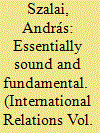| Srl | Item |
| 1 |
ID:
141729


|
|
|
|
|
| Summary/Abstract |
Faced with the strategic uncertainties of the early nuclear age, the US Air Force (USAF) turned to civilian experts (defense rationalists) for help. Although the two communities shared the perception that science-based policies were required, the marriage of two distinct traditions – military and scientific – was not without conflict. Using an interpretivist approach, this article investigates this problematic reconciliation. It construes the realm of nuclear strategy-making as an interpretive enterprise where a multitude of ideas competed. Experts in this environment influenced policy decisions by rendering their ideas persuasive for their military ‘patrons’ through narrative framing devices. Within this conceptualization, bureaucratic dilemmas faced by the patron offered opportunities for experts to establish metaphorical correspondence between their tradition and the patron’s tradition. Such correspondence then lent ideas legitimacy and encouraged organizational support. As an illustration, an analysis is conducted on the role that hallmark RAND ideas on war limitation played in the so-called ‘counterforce’ debate in the early 1960s. This case suggests that the lasting impact of deterrence ideas had less to do with their correspondence to reality, than with their versatility as carriers of constructed ‘scientific’ and ‘rational’ storylines that gained traction within the USAF.
|
|
|
|
|
|
|
|
|
|
|
|
|
|
|
|
| 2 |
ID:
176211


|
|
|
|
|
| Summary/Abstract |
This article highlights the synergies between securitisation theory and the empirically rich literature on crossborder kin-state policies by underlining the unique dilemmas the logic of security brings to the fore in the transborder setting. Doing so, the article critically engages securitisation theory by focusing on two of its underdeveloped aspects: first, the concept’s relevance for non-liberal settings where securitisation can serve multiple goals other than justifying emergency measures; and second, how securitisation can unfold in a trans-border context and thereby disrupt the Westphalian notion of the unity of state, society and sovereignty. The way Hungary’s illiberal regime exported the securitisation of migration to its kin-minority in Transylvania provides the empirical backdrop for the article. Transylvania is neither a target nor a transit region; nevertheless, the securitising narrative resonated with ethnic Hungarians. To account for this resonance, the article relies on the concept of translation to show how local audiences in Transylvania reconstructed the exported meaning of security to suit their own identity, partly by linking it to their historical experiences – even turning it into banal everyday performances – and partly by seeing it as an opportunity to enact national unity and to demonstrate their loyalty to the securitising actor in Budapest, across the border.
|
|
|
|
|
|
|
|
|
|
|
|
|
|
|
|